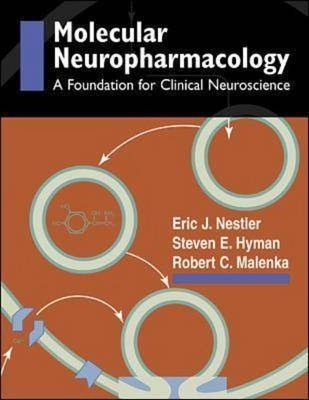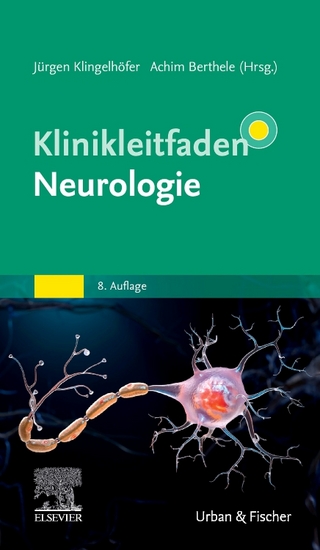
Molecular Basis of Neuropharmacology: A Foundation for Clinical Neuroscience
Appleton & Lange (Verlag)
978-0-8385-6379-3 (ISBN)
- Titel erscheint in neuer Auflage
- Artikel merken
This is the most up-to-date and comprehensive coverage of the relationship of brain function and neuroactive chemicals. The authors are world-known leaders in the field. Molecular neuropharmacology is the hot topic in medicine.
Eric J. Nestler, MD is Professor and Chairman of the Department of Psychiatry and the Center for Basic Neuroscience at the Southwestern Medical School, Graduate School of Biomedical Sciences, Dallas Texas. He is also the Lou and Ellen McGinley Distinguished Chair in Psychiatric Research. The goal of Dr. Nestler's research is to better understand the ways in which the brain responds to repeated perturbations under normal and pathological conditions. A major focus of the research is drug addiction: to identify molecular changes that drugs of abuse produce in the brain to cause addiction, and to characterize the genetic and environmental factors that determine individual differences in the ability of the drugs to produce these changes. A related interest is to understand the contribution of the brain's reward regions to the regulation of normal mood as well as the abnormalities in mood and motivation seen in depression. Dr. Nestler has authored or edited 5 books, and has authored or co-authored 180 original research articles and 90 review articles and book chapters. He currently mentors seven post-doctoral fellows and six graduate students. He has trained 27 post-doctoral researchers, eight research track residents, and ten graduate students. Dr. Nestler is the recipient of numerous awards and honors, including the Pfizer Scholars Award (1987), Sloan Research Fellowship (1987), McKnight Scholar Award (1989), Efron Award of the American College of Neuropsychopharmacology (1994), and Pasarow Foundation Award for Neuropsychiatric Research (1998). He has served on the Board of Scientific Counselors of the National Institute on Drug Abuse, and currently serves on the Scientific Advisory Boards of the National Alliance for Research in Schizophrenia and Depression and of the National Alliance for Autism Research. Dr. Nestler is also a member of the National Advisory Mental Health Council, the Council of the Society for Neuroscience, and the Council of the American College of Neuropsychopharmacology Steven E. Hyman, MD is Provost of Harvard University and Professor of Neurobiology at Harvard Medical School, Boston, MA. From 1996 to 2001, he served as Director of the National Institute of Mental Health (NIMH), the component of the US National Institutes of Health charged with generating the knowledge needed to understand and treat mental illness. Before serving as Director of NIMH, Dr. Hyman was Professor of Psychiatry at Harvard Medical School, Director of Psychiatry Research at Massachusetts General Hospital , and the first faculty Director of Harvard University's Mind, Brain, and Behavior Initiative. In the laboratory he studied the molecular biology of neurotransmitter action. Dr. Hyman is a member of the Institute of Medicine of the National Academy of Sciences and of the American Academy of Arts and Sciences. He is currently serves as Editor of the Annual Review of Neuroscience. He received his BA from Yale College in 1974 summa cum laude, and his MA from the University of Cambridge in 1976, which he attended as a Mellon fellow studying the history and philosophy of science. He earned his MD from Harvard Medical School in 1980. Robert C. Malenka, MD, PhD is Pritzker Professor of Psychiatry & Behavioral Sciences at Stanford University, Palo Alto, CA. He is a fellow of the American Academy of Arts and Sciences, a member of the Institute of Medicine of the National Academies and an Associate of the Neurosciences Research Program. He has won several awards including the International Prize in Neuroscience, the Distinguished Alumni Award from Stanford University and the Daniel Efron Award from the American College of Neuropsychopharmacology. A major goal of his laboratory is to elucidate both the specific molecular events that are responsible for the triggering of these various forms of synaptic plasticity and the exact modifications in synaptic proteins that are responsible for the observed, long-lasting changes in synaptic efficacy.
Part I: Fundamentals of Neuropharmacology. Chapter 1: Basic Principles of Neuropharmacology. Chapter 2: Neurons and Glia. Chapter 3: Electrical Excitability of Neurons. Chapter 4: Synaptic Transmission. Chapter 5: Signal Transduction Pathways in the Brain. Chapter 6: Signaling to the Nucleus. Part II: Neural Substrates of Drug Action. Chapter 7: Excitatory and Inhibitory Amino Acids. Chapter 8: Catecholamines. Chapter 9: Serotonin, Acetylcholine, and Histamine. Chapter 10: Neuropeptides and Purines. Chapter 11: Neurotrophic Factors. Part III: Neuropharmacology of Specific Neural Functions and Related Disorders. Chapter 12: Autonomic Nervous System. Chapter 13: Neuroendocrine Control of the Internal Milieu. Chapter 14: Control of Movement. Chapter 15: Mood and Emotion. Chapter 16: Reinforcement and Addictive Disorders. Chapter 17: Higher Cognitive Function and Psychosis. Chapter 18: Sleep, Arousal, and Attention. Chapter 19: Pain. Chapter 20: Memory and Dementias. Chapter 21: Seizures and Stroke.
| Erscheint lt. Verlag | 16.5.2001 |
|---|---|
| Zusatzinfo | 262 Illustrations, unspecified |
| Verlagsort | Maidenhead |
| Sprache | englisch |
| Maße | 213 x 277 mm |
| Gewicht | 1131 g |
| Themenwelt | Medizin / Pharmazie ► Medizinische Fachgebiete ► Neurologie |
| Medizin / Pharmazie ► Medizinische Fachgebiete ► Pharmakologie / Pharmakotherapie | |
| Naturwissenschaften ► Biologie ► Genetik / Molekularbiologie | |
| ISBN-10 | 0-8385-6379-1 / 0838563791 |
| ISBN-13 | 978-0-8385-6379-3 / 9780838563793 |
| Zustand | Neuware |
| Haben Sie eine Frage zum Produkt? |
aus dem Bereich



